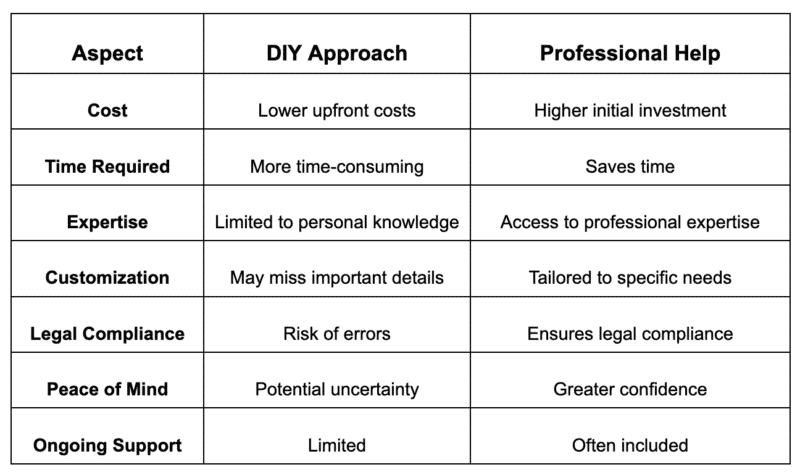Life often throws unexpected challenges your way when you least expect it. One moment, everything seems to be going smoothly, and the next, you’re faced with a situation that prompts serious reflection, leaving you asking what to do next. A plan for protecting your family, no matter what the emergency is, is a wise decision you should make.
This article will explore ten effective strategies to help safeguard your family’s future.
Get Your Legal Ducks in a Row
The first step is to handle the legal matters. While it might not be the most exciting topic, it’s crucial. Wills, trusts, and power of attorney documents are essential tools that guarantee your wishes are followed, and your family is protected in case anything happens to you.
When considering the long-term well-being of your loved ones, particularly in California, it’s essential to implement effective strategies for safeguarding your family’s future. This beautiful state, known for its diverse culture and opportunities, also presents unique challenges in terms of estate management and planning. Engaging with estate planning lawyers in California can be a pivotal step in ensuring that your assets are protected and distributed according to your wishes. These legal professionals can guide you through the complexities of California’s estate laws, helping you create a comprehensive plan that addresses your family’s specific needs and aspirations.
Insurance: Your Financial Safety Net
When life throws the unexpected at you, a safety net is essential to cushion the impact. Here’s what you should consider:
- Life insurance: Ensures the well-being of your family should you be unavailable.
- Health insurance: Stops medical bills from exhausting your savings
- Disability insurance: Provides insurance for your income if you are unable to perform your work
- Homeowners/Renters insurance: Protects your home and possessions
Don’t skimp on coverage. It’s better to have insurance and not need it than to need it and not have it.
Build That Emergency Fund
An emergency fund is your financial safety net when life throws unexpected challenges your way. While not all surprises are pleasant, having 3-6 months’ worth of living expenses saved can provide crucial support during tough times. It may seem daunting at first, but starting small and gradually building up will make a significant difference.
Your future self will thank you when that rainy day comes. Planning with an emergency fund is one of the most important steps in securing your family’s future stability.
Invest in Your Family’s Education
Knowledge is power, and investing in your children’s education opens doors to future opportunities. Start saving early by considering options like 529 plans or Coverdell Education Savings Accounts.
These accounts offer tax benefits and are specifically designed to help fund education, giving your children a strong financial foundation for their future success. The sooner you start, the more you’ll be able to provide them with the resources they need.
Plan for Retirement (Yes, Even If You’re Young)
Retirement may seem like a distant goal, but the earlier you start planning, the more successful you’ll be. If your employer offers a 401(k) with a company match, make it a priority. Even if a 401(k) isn’t available, Individual Retirement Accounts (IRAs) are excellent alternatives. Starting now ensures you’ll build a solid financial foundation for a comfortable retirement.
Teach Financial Literacy
Give your children the gift of financial understanding. Teach them how to manage their money, build savings, and understand the value of a dollar. It’s a skill they will find useful throughout their lives. It also relieves some pressure from you over time.
Consider using age-appropriate games and activities to make learning about money fun and engaging. Encourage your children to set financial goals and help them develop strategies to achieve them.
Create a Family Budget
Know where your money’s going. A family budget helps you track expenses, cut unnecessary costs, and save more. Use apps or traditional spreadsheets – whatever works for you. Involve all family members in the budgeting process to create a sense of shared responsibility. Regularly review and adjust your budget to ensure it remains aligned with your changing financial goals and circumstances.
Protect Your Digital Assets
Don’t disregard your web activities in this modern digital era. Be sure you keep your profiles secure by using a strong password and the two-step verification method. Be certain to keep track of your digital properties alongside the information necessary to access them.
A smart option is to use a password manager, which securely manages and protects your passwords. Regularly update your software and operating systems to protect against the latest security threats. Educate your family members about online safety and the importance of protecting personal information.
Stay Healthy
Your health is your wealth. Prioritize regular check-ups, exercise, and a balanced diet. It’s not just about living longer; it’s about living better. Also, staying healthy can save you a ton of medical expenses down the road. Consider incorporating stress-reduction techniques like meditation or yoga into your daily routine. Make health a family priority by planning active outings and cooking nutritious meals together.
Strong Family Bonds
Last but not least, invest time in your relationships. Strong family bonds provide emotional support and resilience in tough times. Regular family dinners, game nights, or weekend outings can go a long way in building those connections. Create family traditions that everyone looks forward to and cherishes. Encourage open communication and active listening to strengthen understanding and empathy among family members.
Comparison: DIY vs Professional Help for Family Protection

Bringing It All Together
Keeping your family’s future safe requires ongoing and flexible measures. This stands as a continuous project requiring evaluation and adaptation based on human progress. Just remember not to be too stressed about it. Step by step, you’ll gradually develop a robust foundation for the well-being of your family, if you take it one step at a time.
Please remember that perfection is not the target. This is regarding progress and emotional calm. Start with what is possible today and work your way up. The work that you undertake right now will be appreciated by your future self and your family. Taking these steps might seem daunting at first, but each move you make strengthens the safety net for your loved ones.
FAQs
How much life insurance do you need?
There’s no one-size-fits-all answer, but a good rule of thumb is 10-15 times your annual income. Consider your debts, future expenses (like college tuition), and how long your family would need support.
Is a will enough, or do you need a trust too?
It depends on your situation. A will is a great start, but trusts offer additional benefits like avoiding probate and providing more control over how and when your assets are distributed. If you have substantial assets or want more control, a trust might be worth considering.
How do you talk to your kids about money without stressing them out?
Start early and keep it age-appropriate. Use everyday situations as teaching moments. Involve them in family budgeting or give them an allowance to manage. The goal is to make money a normal, non-taboo topic in your household.
Disclaimer: The information provided in this article is for informational purposes only and should not be construed as financial advice. Readers are encouraged to conduct their own research and consult with qualified professionals before making financial decisions. Results may vary, and success stories shared are not indicative of guaranteed outcomes for all individuals.
Published by: Martin De Juan











